This step by step diy woodworking project is about a 20×20 picnic shelter roof plans. This article features detailed instructions for building the gable roof for a square picnic shelter. The roof has a 30 degree slope that should be able to drain the water and snow easily. Check out PART 1 of the project to learn how to frame the shelter. Take a look over the rest of our woodworking plans, if you want to get more building inspiration.
When buying the lumber, you should select the planks with great care, making sure they are straight and without any visible flaws (cracks, knots, twists, decay). Investing in cedar or other weather resistant lumber is a good idea, as it will pay off on the long run. Use a spirit level to plumb and align the components, before inserting the galvanized screws, otherwise the project won’t have a symmetrical look. If you have all the materials and tools required for the project, you could get the job done in about a day. See all my Premium Plans HERE.
Projects made from these plans
20×20 Picnic Shelter Roof Plans
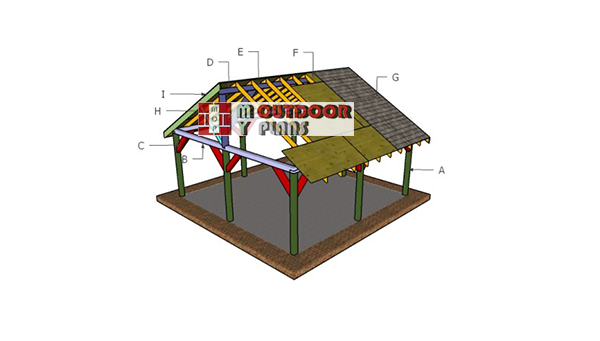
Building-a-20×20-pavilion
Cut & Shopping Lists
- E – 22 pieces of 2×6 lumber – 169 3/4″ long RAFTERS
- F – 12 pieces of 3/4″ plywood – 48″x96″ long, 6 pieces – 48″x48″ long, 4 pieces – 22 3/4″x96″ long, 2 pieces – 22 3/4″x48″ long ROOF
- G – 600 sq ft of tar paper, 600 sq ft asphalt shingles ROOFING
- H – 4 pieces of 2×4 lumber – 59 3/4″ long TRIMS
- I – 4 pieces of 1×8 lumber – 171 3/4″ long TRIMS
- 22 pieces of 2×6 lumber – 16′
- 4 pieces of 1×8 lumber – 16′
- 2 pieces of 1×8 lumber – 20′
- 4 pieces of 2×4 lumber – 6′
- 18 pieces of 3/4″ plywood – 4’x8′
- 44 pieces of rafter ties
- 1000 pieces of 1 5/8″ screws
- 500 pieces of 2″ brad nails
- 600 sq ft of tar paper, 600 sq ft asphalt shingles
- wood glue, stain/paint
Tools
![]() Hammer, Tape measure, Framing square, Level
Hammer, Tape measure, Framing square, Level
![]() Miter saw, Drill machinery, Screwdriver, Sander
Miter saw, Drill machinery, Screwdriver, Sander
Time
Related
- PART 1: 20×20 Picnic Shelter Plans
- PART 2: 20×20 Shelter Roof Plans
How to build a large picnic shelter
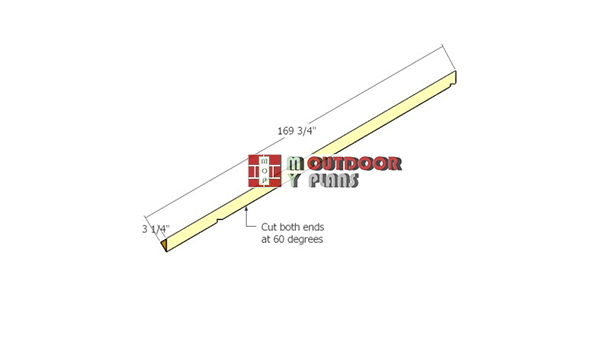
Building-the-rafters
The first step of the project is to build the rafters for the roof using 2×6 beams. As you can see in the plans, you need to cut both ends of the beams at 60 degrees. This means you need to make 30 degree cuts.
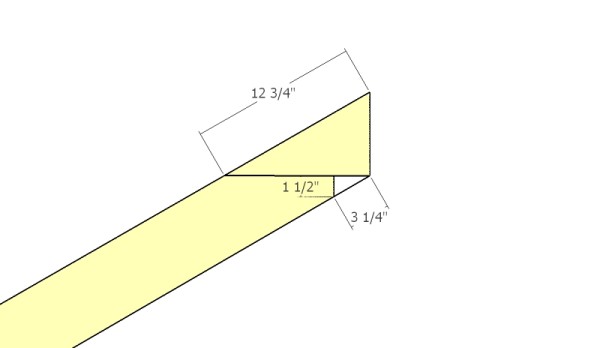
Top notch
Next, you need to make a notch to the top of the rafters, as shown in the diagram. The notch will help you fit the rafters to the top ridge beam easily. Use a circular saw to make the cuts and clean the recess with a chisel.
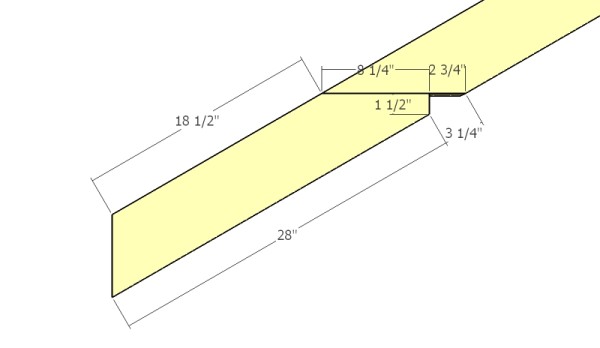
Bottom notch
Make a notch to the bottom of the rafters, so that they can fit into place easily. Mark the cut lines with attention and get the job done with a saw. Smooth the edges with sandpaper.
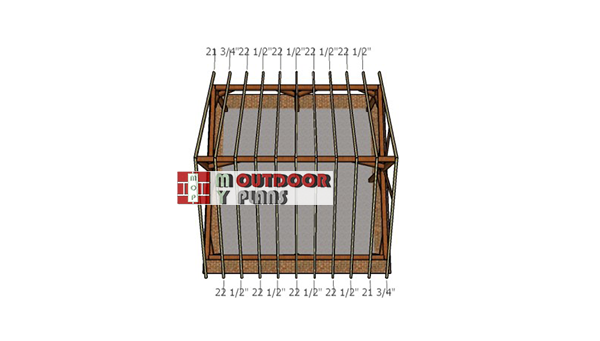
Fitting-the-rafters-to-the-top-of-the-gazebo
Attach the rafters to the top plates of the pavilion, at one end, and to the top ridge, at the other end. Make sure you space the rafters as shown in the diagram, otherwise the roofing sheets won’t fit properly. Use can use framing nails to lock the rafters into place, but the ideal method would be to use ties. Place the rafters every 24″ on center.
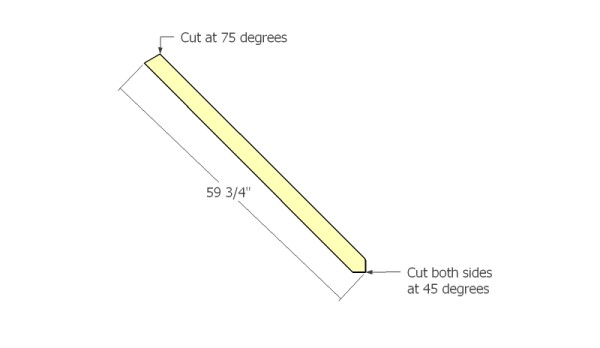
Gable end trims – dimensions
Build decorative trims for the gable ends from 2×4 lumber. Mark the cut lines on the slats and get the job done with a saw. Make a 15 degree cut to one end and two 45 degree cuts at the other end.
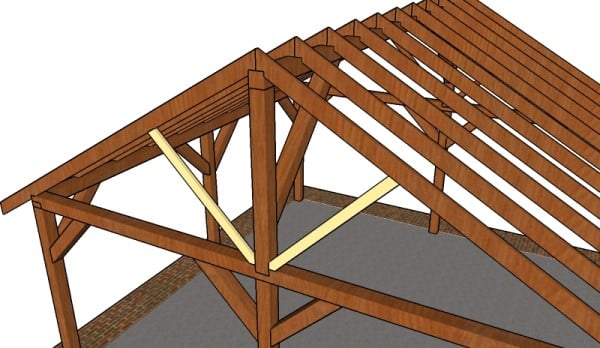
Gable end trims
Fit the trims to the front and back of the picnic shelter. Align the edges with attention, drill pilot holes and lock them into place with 3 1/2″ screws.
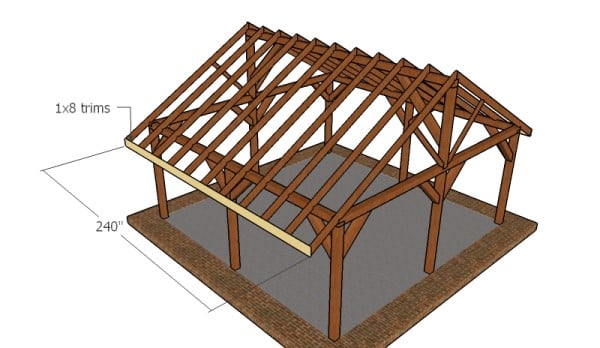
Fitting the side trims
Attach the 1×8 trims to the ends of the rafters, as shown in the plans. Align the trims with attention and secure them into place with 2″ brad nails.
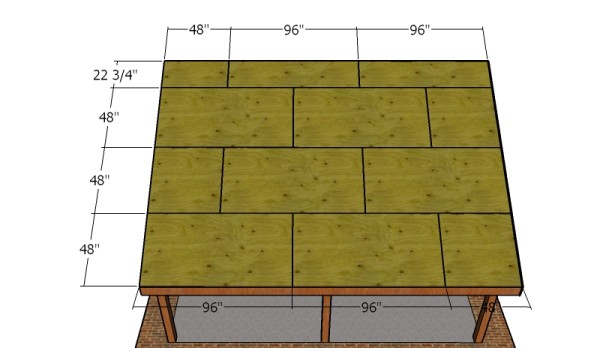
Fitting the roofing sheets
Use 3/4″ plywood sheets for the roofing. Lay the sheets to the rafters following the pattern shown in the plans. Use 1 5/8″ screws to lock the sheets to the rafters. Leave no gaps between the sheets for a professional result.
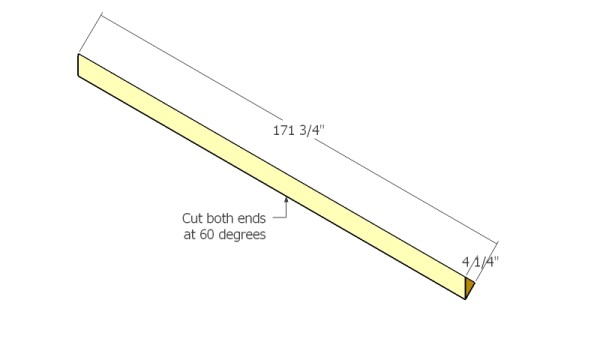
Building the front and back trims
Build the trims for the front and back gable ends of the pavilion from 1×8 lumber. Cut both ends of the trims at 60 degrees, which means you need to make 30 degree cuts.
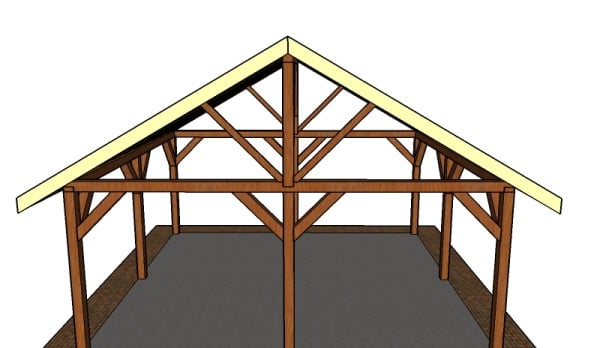
Fitting the front and back trims
Fit the trims to the pavilion and lock them into place with 2″ brad nails.
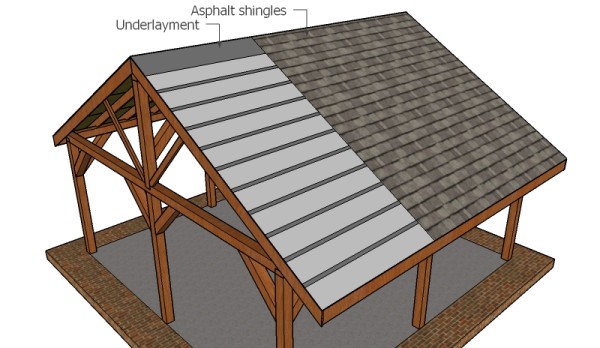
Fitting the roofing
Cover the roof of the shed with roofing felt, making sure the strips overlap at least 2″. Secure the tar paper to the plywood sheets with roofing staples. In addition, cut a 12″ piece for the top ridge. Fit the side drip edges over the roofing felt, while the bottom drip edges should be fit under.
Start the first course of shingles with a full tab, the second with 2 1/2 tabs, the third with 2 tabs, the forth with 1 1/2 tabs, the fifth with 1 tab, the sixth with half tab and the seventh with a 3 tabs.
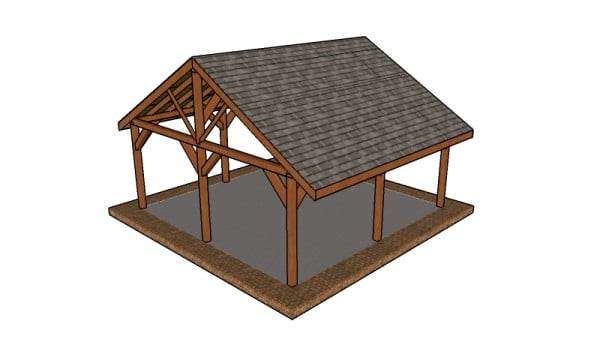
20×20 Picnic Shelter Plans
This structure would make for a perfect picnic shelter, for a basic outdoor pavilion or even a double carport. The beauty of this project is that you can easily make it longer, such as building a 20×40 picnic shelter.
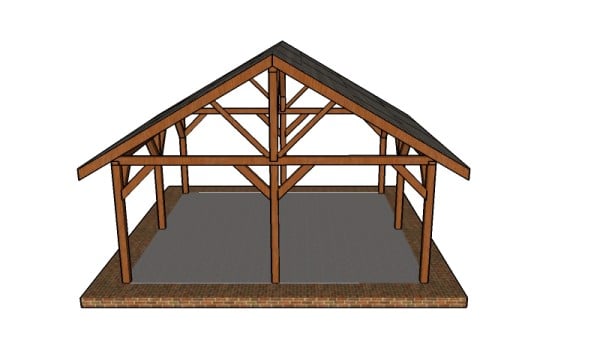
Building a picnic shelter
Fill the holes with wood putty and let them dry out for a few hours. Smooth the surface with 100-220 grit sandpaper and remove the residues with a damp cloth.
Top Tip: Apply a few coats of paint or stain to the components, to enhance the look of the project. Check out PART 1 of the project so you learn how to build the frame for the picnic shelter.
This woodworking project was about 20×20 picnic shelter roof plans free. If you want to see more outdoor plans, check out the rest of our step by step projects and follow the instructions to obtain a professional result.


23 comments
What is your suggestion for making this 20.x30
You first lay out the 20×30 footprint then you have to fit the posts. four posts on the sides and three posts on front and back. Then you follow the instructions, making sure you adjust the dimensions for the new size of the pavilion.
What about how to build a picnic shelter on a 30′ by 40′ concrete slab?
how do I down load the plans to summit for inspection?
Please read the FAQs to learn how to print the plans: http://myoutdoorplans.com/faq/
Thank you for the plans. Quick question, if I extend the project to a 20 x 30; is the top ridge going to need something to support the extra length now that it went from 20 feet to 30 feet. Any suggestions would be greatly appreciated. Thank you
Yes. That would probably require more support (a middle post or you can join the sides with a beam and place the support on top of that). Read the local codes, as well.
Would it be possible to get this plan redimensioned to 19′ x 19′?
Also, I’m just learning SketchUp, are the plans available for download so that I can use that as a base?
Thanks,
Mike
No, to both questions. I don’t have the time to design plans for all dimensions and I cannot share the model, as it is copyrighted by my company.
Do you have an available plan for the 20×20 shelter with a hip roof?
No, I don’t have that.
Is the 20 x 20 picnic shelter plan safe to be built in New Jersey where there’s lots of snow Can the roof sustain the snow
I can’t answer this question. The safest bet would be to read the local building codes and make the necessary adjustments.
Hi! Could I make this as a 20 x 20 frame, but make the roof 20 x 22, with a 2 foot front overhang? Any suggestions on how this could work? Thanks so much!!
Yes, you can. Make the plates and the ridge beam 2 ft longer and then attach the rafters into place.
Can you use tile roof instead of shingles on the 20×20 picnic shelter? Thanks
No, they are too heavy. I recommend you metal sheets with tile design.
Do you have any pavilions with a third gable?
No, I don’t have plans for that right now.
What is the pitch of the roof?
The roof pitch is 7:12
I’m interested in building a 20×20 large picnic area and would like to know if these plans are available on paper. The county I live in this would need to be permitted so I need plans for approval.
The plans are no available on paper, but you can print them from the blog. See the FAQs.